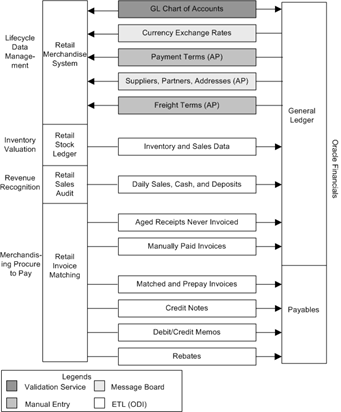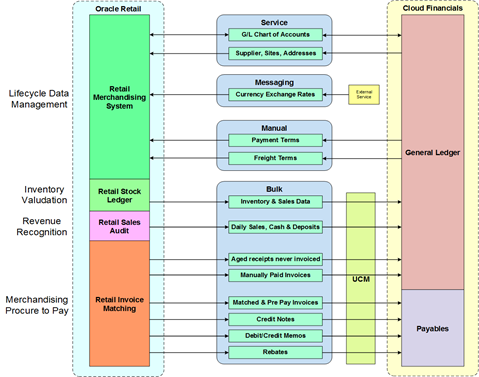Retail Financial Integration (RFI)
The Oracle Retail Financial Integration (RFI) for E-Business Suite (EBS) / PeopleSoft Financials / CFIN provides integration to a robust enterprise financial system to complement the Oracle Retail Merchandising system in a retail customer environment.
Retail Financial Integration (RFI) Products
On-Premise Merchandising to On-Premise Financial Applications
-
RFI for PeopleSoft (On-premise)
-
RFI for EBS (On-premise)
Merchandise Foundation Cloud Service (MFCS) to Financial Applications
-
RFI for MFCS to On-Premise EBS
-
RFI for MFCS to Oracle Cloud Financials
Key Benefits of RFI
-
This integration is not a point-to-point integration between the Financial System (EBS or PeopleSoft or ERP Cloud) and Oracle Retail applications. This RFI implementation is independent of the version of integrated applications. A Oracle Retail Financial
Integration (RFI) layer serves as an intermediate thin layer of application between Financial application (EBS or PeopleSoft or ERP Cloud) and Oracle Retail. This integration remains synchronized with the new releases of the edge applications.
-
Audited transaction data is exported to the Financial applications days before the traditional audit process permits. The Financials applications can use this timely data in a proactive manner, which results in increased productivity and operational efficiencies.
-
Total cost of ownership for Oracle and its customers is reduced.
RFI Processes
-
Life Cycle Data Management - This process provides data synchronization for the initial load prior to implementation and incremental data creation and maintenance after implementation.
-
Inventory Valuation (Retail stock ledger) - This process enables the posting of accounting entries generated from transactions that change the value of sellable products at a retailer's inventory locations (stores and warehouses) to the appropriate ledgers from Oracle Retail Merchandising - stock ledger to Oracle General Ledger (Oracle GL).
-
Retail Revenue Recognition - This process enables posting of accounting entries generated from sales and returns transactions from the retailer's stores for revenue and cash reconciliation to the appropriate ledgers. In this process, the data flows from Oracle Retail Sales Audit (ReSA) to Oracle GL.
-
Retail Merchandising Procure to Pay - This process begins with the Oracle Retail Invoice Matching (ReIM) application. Invoices from suppliers for retail merchandise are matched to the original purchase order (PO) for the merchandise and the receipt of the merchandise by the retailer.

